| Listing 1 - 9 of 9 |
Sort by
|
Book
ISBN: 0262121417 Year: 1989 Volume: vol *4 Publisher: Cambridge, MA : M.I.T. Press,
Abstract | Keywords | Export | Availability | Bookmark
 Loading...
Loading...Choose an application
- Reference Manager
- EndNote
- RefWorks (Direct export to RefWorks)
Book
ISBN: 0262121514 Year: 1991 Publisher: Cambridge, MA : M.I.T. Press,
Abstract | Keywords | Export | Availability | Bookmark
 Loading...
Loading...Choose an application
- Reference Manager
- EndNote
- RefWorks (Direct export to RefWorks)
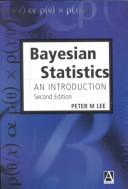
ISBN: 0340677856 0471194816 Year: 1997 Publisher: "London : Arnold,
Abstract | Keywords | Export | Availability | Bookmark
 Loading...
Loading...Choose an application
- Reference Manager
- EndNote
- RefWorks (Direct export to RefWorks)
Bayesian statistical decision theory. --- Statistique bayésienne --- 519.226 --- Bayes' solution --- Bayesian analysis --- Statistical decision --- Inference and decision theory. Likelihood. Bayesian theory. Fiducial probability --- 519.226 Inference and decision theory. Likelihood. Bayesian theory. Fiducial probability --- Bayesian statistical decision theory --- Statistique bayésienne
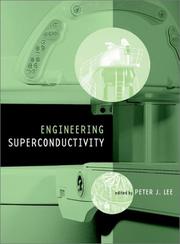
ISBN: 0471411167 9780471411161 9780470547175 0470547170 Year: 2001 Publisher: New York Wiley-Interscience
Abstract | Keywords | Export | Availability | Bookmark
 Loading...
Loading...Choose an application
- Reference Manager
- EndNote
- RefWorks (Direct export to RefWorks)
Comprehensive coverage of superconductivity from the Wiley Encyclopedia of Electrical and Electronics Engineering Engineering Superconductivity features fifty articles selected from the Wiley Encyclopedia of Electrical and Electronics Engineering, the one truly indispensable reference for electrical engineers. Superconductor technology has made highly advanced experiments possible in chemistry, biochemistry, particle physics, and health sciences, and introduced new applications currently in use in fields from medicine to cellular communications. Taken together, these articles-written by acknowledged experts in the field-provide the most complete and in-depth accounting of superconductivity in existence. The book brings together a wealth of information that would not be available to those who do not have access to the full 24-volume encyclopedia. This thorough survey looks at the application of superconductors from an engineer's practical perspective rather than a theoretical approach. Engineering Superconductivity provides full coverage of the fundamentals of superconducting behavior and explains the properties and fabrication methods of commercially produced superconductors. Up-to-date material on superconductor applications as well as competing technologies is included. The fifty articles presented here are divided into three sections: . Superconductivity and magnetism. Superconductors. Applications and related technology Engineering Superconductivity is a complete and up-to-date reference for engineers, physicists, chemists, materials scientists, and anyone working with superconductors.
537.6 --- Magnetism --- 537.6 Magnetism --- High temperature superconductors --- Superconductors --- Electrical & Computer Engineering --- Engineering & Applied Sciences --- Electrical Engineering --- Industrial applications --- Superconducting materials --- Superconductive devices --- Cryoelectronics --- Electronics --- Solid state electronics --- Materials at low temperatures --- Materials --- Industrial applications.

ISBN: 1316086003 1280161531 0511121547 0511062826 0511204671 0511307527 0511485956 0511071280 9780511062827 9780511121548 9780511071287 9780511485954 9780511204678 9786610161539 6610161534 0521828589 9780521828581 9780521100656 0521100658 Year: 2003 Publisher: Cambridge Cambridge University Press
Abstract | Keywords | Export | Availability | Bookmark
 Loading...
Loading...Choose an application
- Reference Manager
- EndNote
- RefWorks (Direct export to RefWorks)
This is a comprehensive narrative history of Korean literature. It provides a wealth of information for scholars, students and lovers of literature. Combining both history and criticism the study reflects the latest scholarship and offers a systematic account of the development of all genres. Consisting of twenty-five chapters, it covers twentieth-century poetry, fiction by women and the literature of North Korea. This is a major contribution to the field and a study that will stand for many years as the primary resource for studying Korean literature.
Korean literature --- History and criticism. --- K9700 --- History and criticism --- Korea: Literature -- general and history --- Arts and Humanities --- Literature --- Korean literature - History and criticism
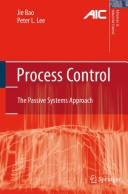
ISBN: 1280937521 9786610937523 1846288932 1846288924 1849966699 Year: 2007 Publisher: London : Springer,
Abstract | Keywords | Export | Availability | Bookmark
 Loading...
Loading...Choose an application
- Reference Manager
- EndNote
- RefWorks (Direct export to RefWorks)
Process Control introduces an emerging area in process control – control system analysis and design based on the concept of passive systems. Passive systems are a class of processes that dissipate certain types of physical or virtual energy, defined by Lyapunov-like functions. Passivity and associated stability conditions form one of the cornerstones in control theory and have recently begun to be applied in process control. Defined as an input-output property, the concept of passivity implies stability conditions for interconnected systems. Passive systems are minimum phase and thus very easy to control via output feedback, even if they are highly nonlinear and coupled. Therefore, the passivity framework can be used in process input-output controllability analysis as well as control design. Here, the concept of passive systems is also linked to process thermodynamics to provide process engineers with insights into the physical bases of the above results. In this book, passivity-based developments in the areas of robust process control, decentralized control, fault tolerant control, process controllability analysis and nonlinear process control are addressed systematically for the first time. Written for the industrial, engineering and academic communities, the emphasis is placed on results that enhance insight and intuition. Application issues are illustrated by case studies in all the main chapters. MATLAB® routines for selected examples and a library of functions that implement the system analysis and control design methods developed in Process Control can be downloaded from springer.com. This book presents the reader with both the conceptual framework and practical tools for passivity-based system analysis and control.
Passivity-based control. --- Process control. --- Control of industrial processes --- Industrial process control --- Automatic control --- Manufacturing processes --- Quality control --- Chemical engineering. --- System theory. --- Control and Systems Theory. --- Industrial Chemistry/Chemical Engineering. --- Systems Theory, Control. --- Robotics and Automation. --- Chemistry, Industrial --- Engineering, Chemical --- Industrial chemistry --- Engineering --- Chemistry, Technical --- Metallurgy --- Systems, Theory of --- Systems science --- Science --- Philosophy --- Systems theory. --- Control engineering. --- Robotics. --- Automation. --- Control engineering --- Control equipment --- Control theory --- Engineering instruments --- Automation --- Programmable controllers --- Automatic factories --- Automatic production --- Computer control --- Engineering cybernetics --- Factories --- Industrial engineering --- Mechanization --- Assembly-line methods --- Automatic machinery --- CAD/CAM systems --- Robotics --- Machine theory
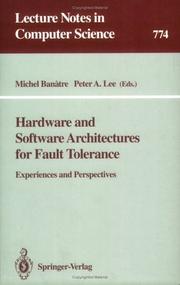
ISBN: 038757767X 354057767X 3540483306 Year: 1994 Volume: 774 Publisher: Berlin : Springer-Verlag,
Abstract | Keywords | Export | Availability | Bookmark
 Loading...
Loading...Choose an application
- Reference Manager
- EndNote
- RefWorks (Direct export to RefWorks)
Fault tolerance has been an active research area for many years. This volume presents papers from a workshop held in 1993 where a small number of key researchers and practitioners in the area met to discuss the experiences of industrial practitioners, to provide a perspective on the state of the art of fault tolerance research, to determine whether the subject is becoming mature, and to learn from the experiences so far in order to identify what might be important research topics for the coming years. The workshop provided a more intimate environment for discussions and presentations than usual at conferences. The papers in the volume were presented at the workshop, then updated and revised to reflect what was learned at the workshop.
Fault-tolerant computing --- Congresses --- Computer architecture --- Software engineering. --- Computer network architectures. --- Information theory. --- Operating systems (Computers). --- Database management. --- Computer science. --- Special Purpose and Application-Based Systems. --- Computer System Implementation. --- Theory of Computation. --- Operating Systems. --- Database Management. --- Data Storage Representation. --- Informatics --- Science --- Data base management --- Data services (Database management) --- Database management services --- DBMS (Computer science) --- Generalized data management systems --- Services, Database management --- Systems, Database management --- Systems, Generalized database management --- Electronic data processing --- Computer operating systems --- Computers --- Disk operating systems --- Systems software --- Communication theory --- Communication --- Cybernetics --- Architectures, Computer network --- Network architectures, Computer --- Computer software engineering --- Engineering --- Operating systems
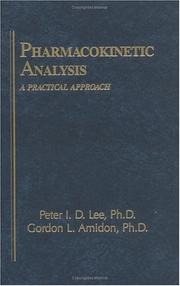
ISBN: 1566764254 Year: 1996 Publisher: Lancaster, Pa Technomic
Abstract | Keywords | Export | Availability | Bookmark
 Loading...
Loading...Choose an application
- Reference Manager
- EndNote
- RefWorks (Direct export to RefWorks)
Biopharmaco-efficiency. Pharmacokinetics --- Pharmacokinetics. --- Pharmacocinétique --- Pharmacocinétique
Book
ISBN: 303038862X 3030388611 Year: 2020 Publisher: Cham : Springer International Publishing : Imprint: Springer,
Abstract | Keywords | Export | Availability | Bookmark
 Loading...
Loading...Choose an application
- Reference Manager
- EndNote
- RefWorks (Direct export to RefWorks)
This book addresses the biological processes relevant to the immune phenotypes of cancer and their significance for immune responsiveness, based on the premise that malignant cells manipulate their surroundings through an evolutionary process that is controlled by interactions with innate immune sensors as well as the adaptive recognition of self/non-self. Checkpoint inhibitor therapy is now an accepted new form of cancer treatment. Other immuno-oncology approaches, such as adoptive cell therapy and metabolic inhibitors, have also shown promising results for specific indications. Immune resistance is common, however, limiting the efficacy of immunotherapy in many common cancer types. The reasons for such resistance are diverse and peculiar to the immune landscapes of individual cancers, and to the treatment modality used. Accordingly, approaches to circumvent resistance need to take into account context-specific genetic, biological and environmental factors that may affect the cancer immune cycle, and which can best be understood by studying the target tissue and correlated systemic immune markers. Understanding the major requirements for the evolutionary process governing human cancer growth in the immune-competent host will guide effective therapeutic choices that are tailored to the biology of individual cancers.
Oncology . --- Immunology. --- Oncology. --- Immunobiology --- Life sciences --- Serology --- Tumors --- Cancer --- Immunological aspects. --- Carcinogenesis --- Tumor immunology --- Immunological aspects --- Tumor Microenvironment --- Neoplasms --- immunology.
| Listing 1 - 9 of 9 |
Sort by
|

 Search
Search Feedback
Feedback About UniCat
About UniCat  Help
Help News
News